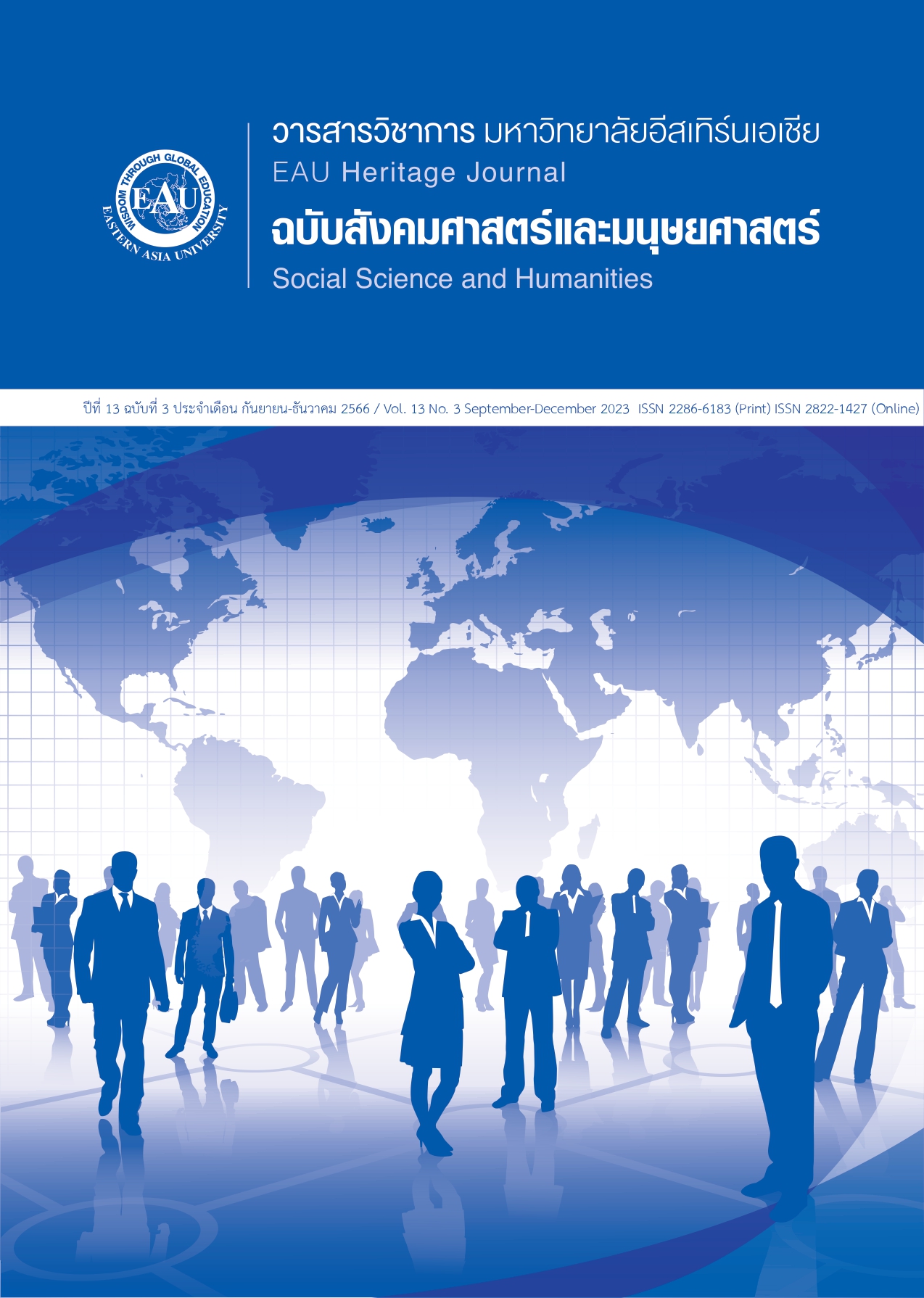Development of a Ubiquitous Learning Model to Promotes Self-Directed Learning in General Chemistry Course 1 for Students of Rajabhat Rajanagarindra University
Keywords:
Ubiquitous Teaching, Self-directed LearningAbstract
The objectives of this research were to (1) develop a ubiquitous learning model that promoted self-directed learning in General Chemistry Course 1 for students of Rajabhat Rajanagarindra University (2) compare learning achievement of students before and after the implementation of the ubiquitous learning model (3) study levels of satisfaction of students with the self-directed learning model and (4) study levels of self-directed learning of students. The population was 57 students. The sample selected using purposive sampling method were 24 first-year students from Manufacturing Process Automation Department and Industrial Management Department of Industrial Technology Faculty. The instruments for data collection were (1) learning management assessment form (2) learning achievement test (3) satisfaction form and (4) behavior form of self-directed learning. The statistics used for data analysis were mean, standard deviation, and T-Test.The research results were as follows: (1) the ubiquitous learning model comprised of 8 components in terms of learning management system, network administrative system, learning ubiquitous system, content system, lecturers, students, evaluation and assessment system, equipment. The experts assessed the possibility and validity of the theory at the highest level ("= 4.80- 5.00 SD = 0.00 - 0.55). (2) the learning achievement after implementation of a learning ubiquitous model was higher than before implementation, with a statistical significance of .05%. (3) the level of students’ satisfaction with the self-directed learning model was the highest in all aspects ("" = 4.63 SD = 0.53). (4) the overall level of self-directed learning of students was high (""= 3.51 SD = 1.33).
References
Chang, Lei. (1993). Using Confirmatory Factor Analysis of Multitrait – Multimethod Data to Assess
the Psychometrical of 4-Point and 6-Point Likert Type Scales. Paper presented at the
Annual Meeting of the National Council on Measurement in Education.
Champakul, P., Innoi, S., & Boonphak, K. (2021). The development of ubiquitous learning
management system using imagineering on construction of multimedia. journal of
education Naresuan University, 23(3), 175-189. (in Thai)
Costa, A. L., & Kallick, B. (2004). Launching self-directed learners. Educational leadership, 62, 51-57.
Inthachot, M. (2022). Practical skills through self-led learning of students at Rajamangala University of
Technology Thanyaburi. Journal of Social Science and Buddhist Anthropology, 7(6), 131-145.
(in Thai)
Jones, V. and Jo, J.H. (2004). “Ubiquitous Learning Environment : An Adaptive TeachingSystem Using
Ubiquitous Technology.” [ online ]. Retrieved June
,2021from/https://www.researchgate.net/publication/29453419
_Ubiquitous_learning_environment_An_adaptive_teaching_system_using_ubiquitous_technology
Khoochonthara, P. (2016). The role of e-Learning and self-guided learning. Thammasat University
Hospital Journal Online, 1(1), 53-61..
Komanee, S. (2019). Conditioning model. Educational environment for Higher education students.
Journal of Education, Burapha University, 30(3), 30-48. (in Thai)
Phromwong,.C. (2010). “System and organization” in Educational system organization.
Compilation of subject matter 27703 Unit 1-8 Graduate Studies in Education
Sukhothai Thammathirat Open University Nonthabu (in Thai)
Khaemmanee, T. (2016). Instructional Styles: Multiple Choices. 20th edition. Bangkok:
Chulalongkorn University Press. (in Thai)
Liwa, J. (2019). Lesson Development. interactive electronics in Ubiquitous environment.Journal of
Technology Management Rajabhat Maha Sarakham University, 6(1), 89-97. (in Thai)
Pholchanngam, P. (2022). The Development of Learning Management System for U-Learning to the
Vocational Education: The Development of Learning Management System for U-Learning to the
Vocational Education. Research and Innovation Journal of Vocational Education Institute,
Bangkok, Thailand. 5(1). (in Thai)
Prompalad, N., Kaosaiyaporn,O., Atisabda, W., & Sinlapametakul, A. (2021). The development of
learning styles using technology. Virtual Reality in Ubiqui Learning Environment Virtus to promote
creativity in Islamic art. Journal of Education and Innovative Learning, 1(1), 79-95. (in Thai)
Roawroo, I. (2010). The development of a blended learning model to increase the efficiency of self-
education. Doctor of Philosophy Thesis, King Mongkut's University of Technology North Bangkok. (in Thai)
Ruengsri,P. (2017). The development of teaching and learning activities in reverse classroom style
through online media that affects self-leading of high school students in academic, career and
technology. Veridian E-Journal, Silpakorn University (Humanities) , Social Sciences and arts),
(3), 2221-2233. (in Thai)
Siksen, S., Phumeechanya, N., & Laisema, S. (2018). The Development of System and Collaborative
Learning Activities in Ubiquitious Learning Environments Using Computer Tablet with QR Code.
Veridian E-Journal, Silpakorn University (Humanities, Social Sciences and arts), 11(5), 645-659.
(in Thai)
Sowers, J. A., et. Al. (2004). “Evaluation of the Effects of an Inservice Training Program on
Nursing Faculty Member Perceptions, Knowledge, and Concerns About Students with
Disabilities”. Journal of Nursing Education. Vol. 43 no. 6 (June 2004) p.248-52 .
Thanakitchareonsuk, T & PipatJamroenkul, Y. (2018). The project is a ubiquitous learning platform for
undergraduate students. Journal of Educational Studies, 33(2), 87-94. (in Thai)
Thongkaew, T. (2020). Educational design in a new way of life: the impact of the COVID-19
epidemic.Teachers Council of Thailand JOURNAL OF TEACHER PROFESSIONAL DEVELOPMENT,
(2) , (in Thai)
Yodsaneha, S.,Sompong, N., & Soopeerak, S. (2020). Netivism to develop conversational skills English
among students at Rajamangala University of Technology Thanyaburi. Journal of Social Science
and Buddhist Anthropology, 5(8), 343-355. (in Thai)





